
Space Exploration Technologies Corporation, commonly referred to as SpaceX, is an American spacecraft manufacturer, launch service provider and satellite communications company headquartered in Hawthorne, California. The company was founded in 2002 by Elon Musk with the goal of reducing space transportation costs and ultimately developing a sustainable colony on Mars. The company currently produces and operates the Falcon 9 and Falcon Heavy rockets along with the Dragon and Starship spacecraft.

Falcon 1 was a small-lift launch vehicle that was operated from 2006 to 2009 by SpaceX, an American aerospace manufacturer. On 28 September 2008, Falcon 1 became the first privately developed fully liquid-fueled launch vehicle to go into orbit around the Earth.

Falcon 9 is a partially reusable medium-lift launch vehicle that can carry cargo and crew into Earth orbit, designed, manufactured and launched by American aerospace company SpaceX. It can also be used as an expendable heavy-lift launch vehicle. The first Falcon 9 launch was on 4 June 2010. The first Falcon 9 commercial resupply mission to the International Space Station (ISS) launched on 8 October 2012. In 2020 it became the first commercial rocket to launch humans to orbit. In 2022, it became the U.S. rocket with the most launches in history and with the best safety record, having suffered just one flight failure.

FalconSAT is the United States Air Force Academy's (USAFA) small satellite engineering program. Satellites are designed, built, tested, and operated by Academy cadets. The project is administered by the USAFA Space Systems Research Center under the direction of the Department of Astronautics. Most of the cadets who work on the project are pursuing a bachelor of science degree in astronautical engineering, although students from other disciplines join the project.
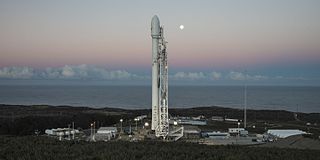
Space Launch Complex 4 (SLC-4) is a launch and landing site at Vandenberg Space Force Base, California, U.S. It has two pads, both of which are used by SpaceX for Falcon 9, one for launch operations, and the other as Landing Zone 4 (LZ-4) for SpaceX landings.

DDISHTV is a Mongolian Direct-to-home television service provider company led by Bold Ganbat (CEO).

Falcon Heavy is a partially reusable super heavy-lift launch vehicle that can carry cargo into Earth orbit, and beyond. It is designed, manufactured and launched by American aerospace company SpaceX.

Notable spaceflight activities in 2017 included the maiden orbital flight of India's Geosynchronous Satellite Launch Vehicle Mark III on 5 June and the first suborbital test of Rocket Lab's Electron rocket, inaugurating the Mahia spaceport in New Zealand. The rocket is named for its innovative Rutherford engine which feeds propellants via battery-powered electric motors instead of the usual gas generator and turbopumps.
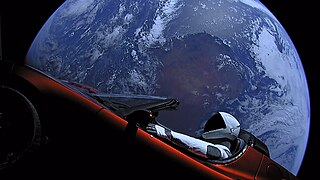
This article documents notable spaceflight events during the year 2018. For the first time since 1990, more than 100 orbital launches were performed globally.
SkySat is a constellation of sub-meter resolution Earth observation satellites owned by Planet Labs, providing imagery, high-definition video and analytics services. Planet acquired the satellites with their purchase of Terra Bella, a Mountain View, California-based company founded in 2009 by Dan Berkenstock, Julian Mann, John Fenwick, and Ching-Yu Hu, from Google in 2017.
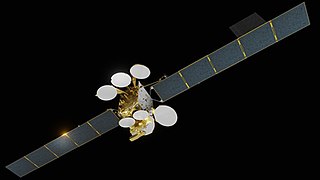
Türksat 5A, is a Turkish communications satellite, operated by Türksat A.Ş. for commercial and military purposes.

Planet Labs PBC is a publicly trading American Earth imaging company based in San Francisco, California. Their goal is to image the entirety of the Earth daily to monitor changes and pinpoint trends.

Falcon 9 Full Thrust is a partially reusable medium-lift launch vehicle, designed and manufactured by SpaceX. It was first designed in 2014–2015, with its first launch operations in December 2015. As of 29 June 2024, Falcon 9 Full Thrust had performed 331 launches without any failures. Based on the Laplace point estimate of reliability, this rocket is the most reliable orbital launch vehicle in operation.
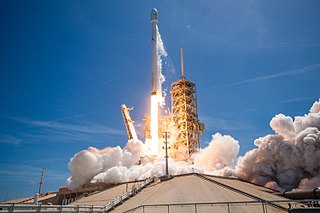
BulgariaSat-1 is a geostationary communications satellite operated by Bulgaria Sat and manufactured by SSL. The satellite will provide high definition and ultra-high-definition television, very-small-aperture terminal (VSAT) communications, satellite news gathering relays, and other communications services, primarily to the Balkan Peninsula and Central/Western Europe.
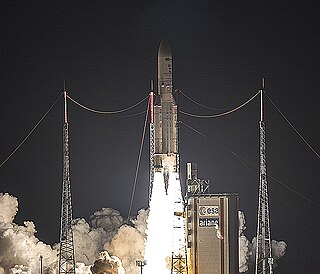
Koreasat is a series of South Korean communications satellites operated by KT SAT, a subsidiary of KT Corporation.

Koreasat 7 is a South Korean communications satellite operated by KT SAT, a subsidiary of KT Corporation. Thales Alenia Space was contracted in 2014 to build both it and Koreasat 5A. Koreasat 7A was launched into geosynchronous orbit on 4 May 2017 aboard an Ariane 5 ECA launch vehicle and placed at 116 degrees east longitude to provide coverage over East Asia.














